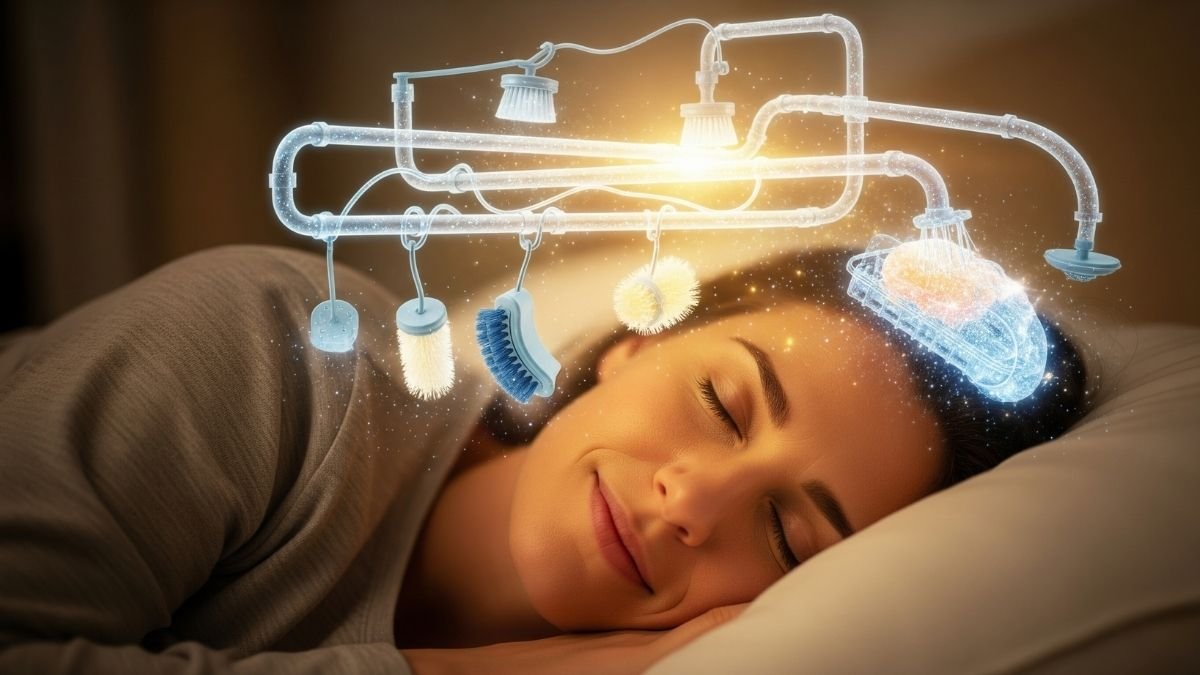
Have you ever wondered why you feel so much clearer after a good night’s sleep? Turns out, there’s a literal reason for that feeling.
While you’re peacefully dreaming, your brain transforms into the world’s most sophisticated cleaning facility. I’m not speaking metaphorically here—scientists have actually discovered that your brain has a dedicated waste removal system that kicks into high gear the moment you fall asleep.
This discovery is changing everything we know about sleep, memory, and preventing diseases like Alzheimer’s. And the best part? You can start optimizing this system tonight.
The Mind-Blowing Discovery That Changes Everything About Sleep
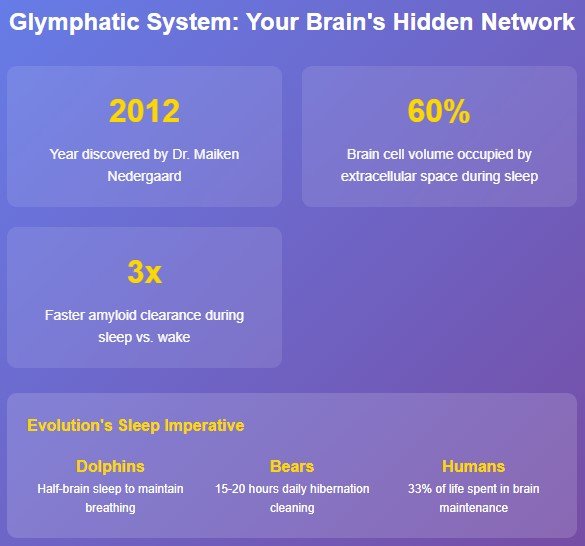
Let me paint you a brain of what’s happening in your head right now as you read this.
Your brain cells are working overtime, processing information, forming memories, and keeping you conscious. But all this mental activity creates waste—think of it like the exhaust from a car engine. Toxic proteins start building up between your brain cells, including the same ones linked to Alzheimer’s disease.
Now here’s where it gets fascinating.
The moment you fall into deep sleep, your brain essentially flips a switch. A hidden network called the glymphatic system (clever name combining brain “glia” cells with “lymphatic” drainage) springs into action.
And when I say “springs into action,” I mean it literally increases its activity by 60-90% compared to when you’re awake.
Think of it this way: during the day, your brain is like a busy restaurant kitchen. The focus is on serving customers (processing thoughts and experiences). But at night? That same kitchen transforms into a deep-cleaning operation, scrubbing every surface and clearing out all the garbage.
Why Your Brain Can’t Clean and Think at the Same Time

Here’s something that blew my mind when I first learned about it: your brain physically can’t do both jobs simultaneously.
During the day, your brain cells are tightly packed together, leaving little room for cleaning fluid to flow through. But when you sleep, something amazing happens—the spaces between your brain cells expand by 60%, creating superhighways for waste removal.
It’s like your brain has two modes:
- Day mode: Focused on thinking, processing, and being aware
- Night mode: Focused on maintenance and deep cleaning
You literally cannot have both at the same time. This is why pulling all-nighters feels so awful—you’re forcing your brain to keep working without giving it time to clean house.
The 2024 Breakthrough That Has Scientists Excited

This year brought some incredible discoveries about how this cleaning system actually works.
Researchers at Washington University made a stunning finding: individual brain cells act like tiny pumps during sleep. These neurons coordinate their electrical activity to create powerful, synchronized waves that physically push cleaning fluid through your brain tissue.
Dr. Li-Feng Jiang-Xie, who led this research, explained it perfectly: “These neurons are miniature pumps. Synchronized neural activity powers fluid flow and removal of debris from the brain.”
But here’s the part that gave me chills—this pumping action requires you to be unconscious. Your brain can’t run its cleaning cycle while you’re awake and aware.
The 50-Second Rhythm That Could Save Your Memory
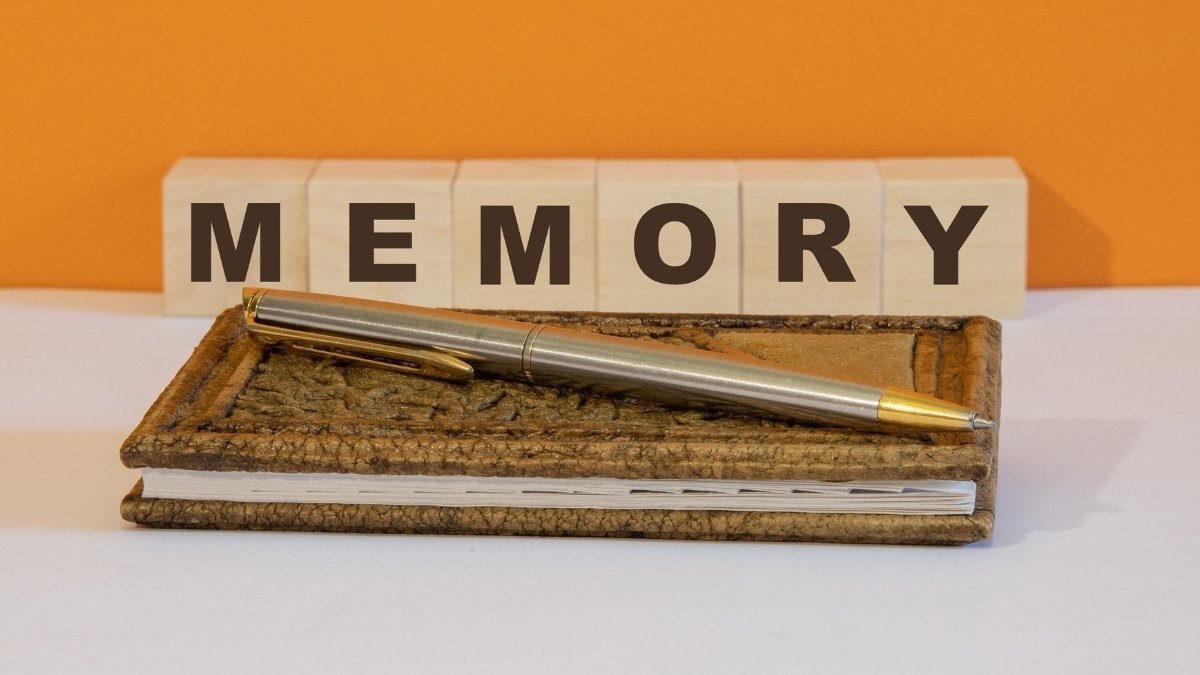
Get this: during deep sleep, your brain releases waves of a chemical called norepinephrine every 50 seconds. This creates a rhythmic pumping action that drives cleaning fluid through your brain.
Think of it like a washing machine cycle, but for your brain.
Dr. Natalie Hauglund, who discovered this rhythm, describes norepinephrine as “the conductor of an orchestra—there’s harmony in the constriction and dilation of the arteries, which drives cerebrospinal fluid through the brain to remove waste products.”
Here’s where it gets concerning: common sleep medications like Ambien disrupt this natural 50-second rhythm. Studies show Ambien reduces these crucial cleaning waves by 50% and decreases brain fluid transport by more than 30%.
You fall asleep faster, sure. But your brain doesn’t get properly cleaned.
It’s the difference between being knocked unconscious and experiencing truly restorative sleep.
The Dementia Numbers That Should Wake You Up
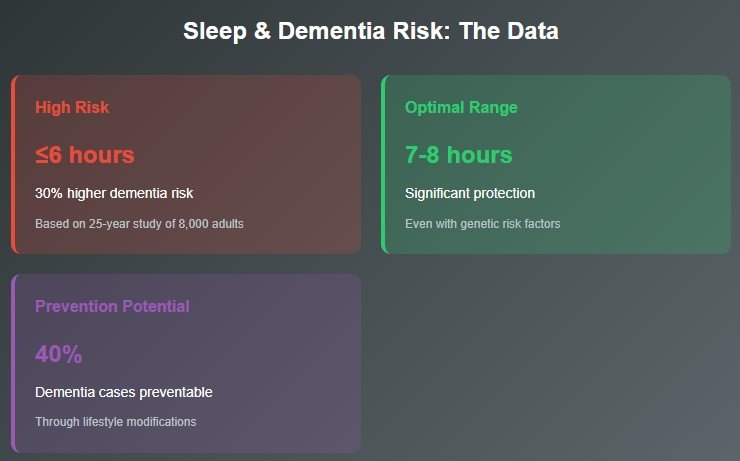
Let’s discuss some statistics that may motivate you to prioritize your sleep tonight.
People who sleep 6 hours or less per night have a 30% higher risk of developing dementia. This is based on a massive 25-year study that followed nearly 8,000 people.
But here’s the hopeful part: sleeping 7-8 hours provides significant protection, even if you have genetic risk factors for Alzheimer’s.
Just One Bad Night Does Damage
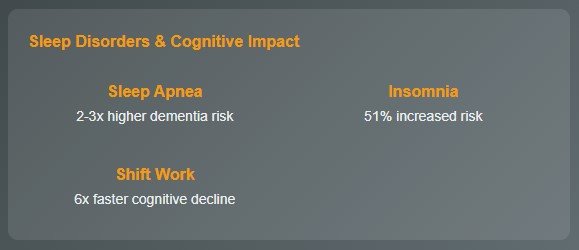
Here’s something that shocked me: a single night of poor sleep causes measurable increases in toxic brain proteins. Researchers can actually see amyloid-beta building up in your brain after just one sleepless night.
The proteins start accumulating in the hippocampus and thalamus—exactly the areas first affected by Alzheimer’s disease.
But don’t panic. The good news is this: up to 40% of dementia cases could be prevented through lifestyle changes, with sleep optimization being one of the most powerful tools we have.
As Dr. Amy Amara from the University of Colorado puts it: “Even people who had genetic risk could protect themselves if they were good sleepers.”
How Your Brain Waves Orchestrate the Ultimate Deep Clean
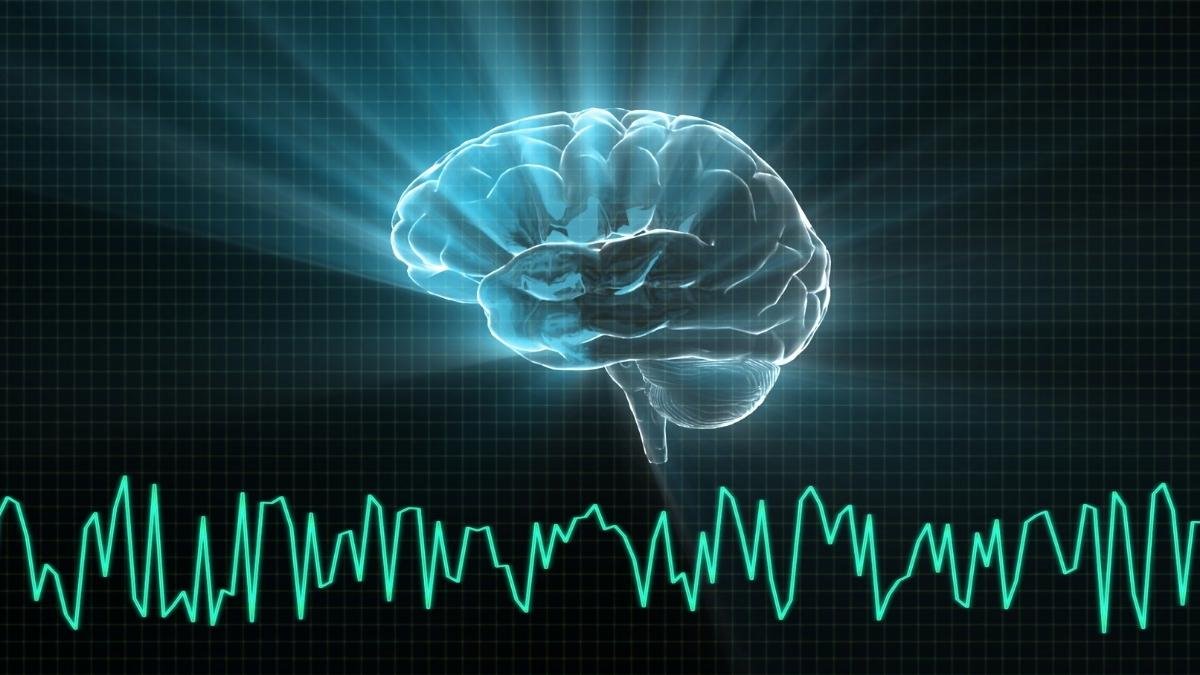
Want to know exactly how this cleaning process works? It’s actually pretty amazing.
When you enter deep sleep, your brain waves slow down and become incredibly synchronized. These aren’t random electrical signals—they’re precisely coordinated cleaning instructions.
Here’s the step-by-step process:
- Your brain waves synchronize and create slow, powerful pulses
- These waves coordinate with your heartbeat to drive cleaning fluid deep into brain tissue
- Star-shaped brain cells called astrocytes act like molecular bouncers, controlling fluid flow
- Toxic proteins get swept away at a rate of 3 billion water molecules per second
- Waste gets flushed out through your lymphatic system
It’s like your brain becomes a sophisticated car wash, with each component playing a specific role in the cleaning process.
Why Deep Sleep Is Non-Negotiable
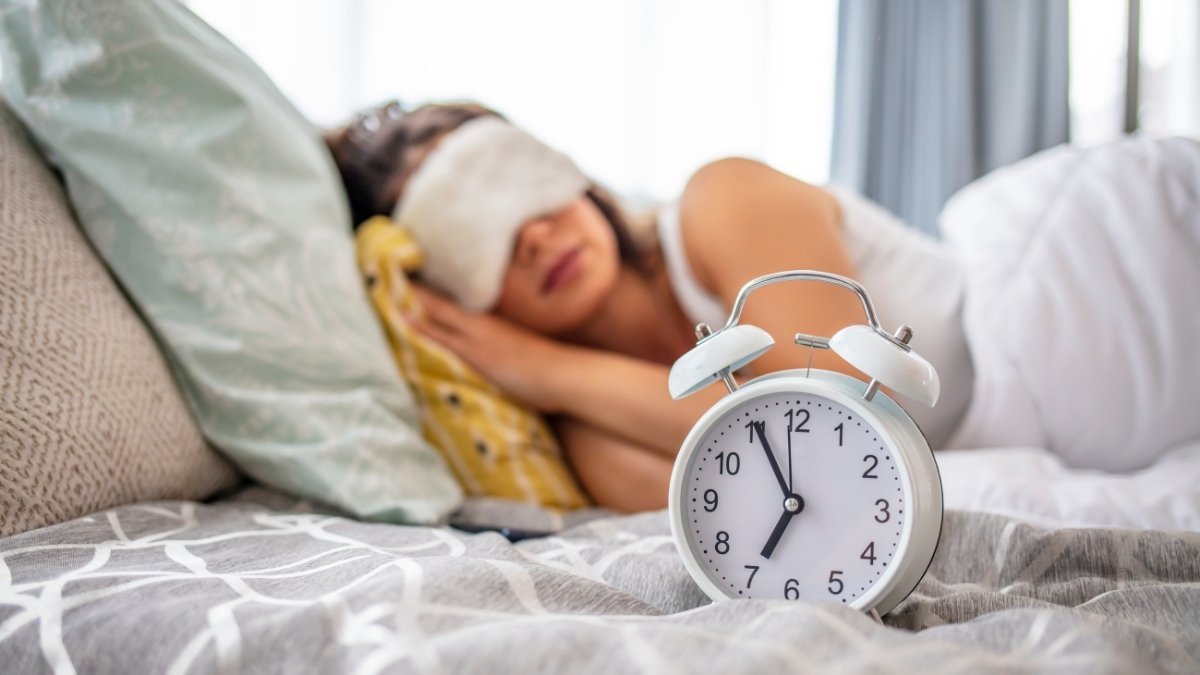
Not all sleep is created equal when it comes to brain cleaning.
Light sleep and REM sleep? Some cleaning happens, but not much.
Deep, slow-wave sleep? This is where the magic happens.
The deeper your sleep, the more efficient your brain’s cleaning system becomes. This is why sleep quality matters just as much as sleep quantity.
The Simple Sleep Position That Boosts Brain Cleaning by 25%
Sleep Position Impact on Brain Cleaning
Side Sleeping
Back Sleeping
Stomach Sleeping
Animal Sleep Positions in Nature
Here’s a game-changer that costs you nothing: sleep on your side.
Research shows that side sleeping (either left or right) increases brain cleaning efficiency by up to 25% compared to sleeping on your back or stomach.
Why? Gravity helps cerebrospinal fluid flow through your brain more efficiently when you’re on your side. Plus, it reduces activity in your sympathetic nervous system, allowing your body to focus energy on cleaning.
Most animals naturally sleep on their sides, which suggests evolution figured this out long ago.
How to Become a Side Sleeper

If you’re currently a back or stomach sleeper, here’s how to make the switch:
- Use a body pillow to maintain position throughout the night
- Try the tennis ball technique: tape a tennis ball to your pajama back to prevent rolling over
- Start gradually: even spending part of the night on your side helps
- Don’t sacrifice comfort: a poor night’s sleep defeats the purpose
The Mistakes That Sabotage Your Brain’s Cleaning Crew
Sleep Saboteurs: Impact on Brain Cleaning
📱 Blue Light Exposure
🍷 Alcohol Before Bed
🍕 Late Night Eating
😴 Weekend Sleep-ins
The Cost of Poor Sleep Hygiene
Even if you’re getting 7-8 hours of sleep, you might be undermining your brain’s cleaning system without realizing it.
Mistake #1: Using Your Phone as a Sleep Aid

I get it—scrolling through your phone feels relaxing after a long day. But that blue light is tricking your brain into thinking it’s daytime.
The result? Your brain doesn’t produce enough melatonin to trigger the deep cleaning cycle.
Better approach: Power down all screens 1-2 hours before bed. Try reading a physical book instead.
Mistake #2: Weekend Sleep-In Sessions

“I’ll just catch up on sleep this weekend.” Sound familiar?
Unfortunately, sleeping in on weekends creates “social jet lag” that disrupts your brain’s weekly cleaning schedule. Consistency matters more than total hours.
Better approach: Stick to the same sleep schedule within 1 hour, even on weekends.
Mistake #3: The Nightcap Trap
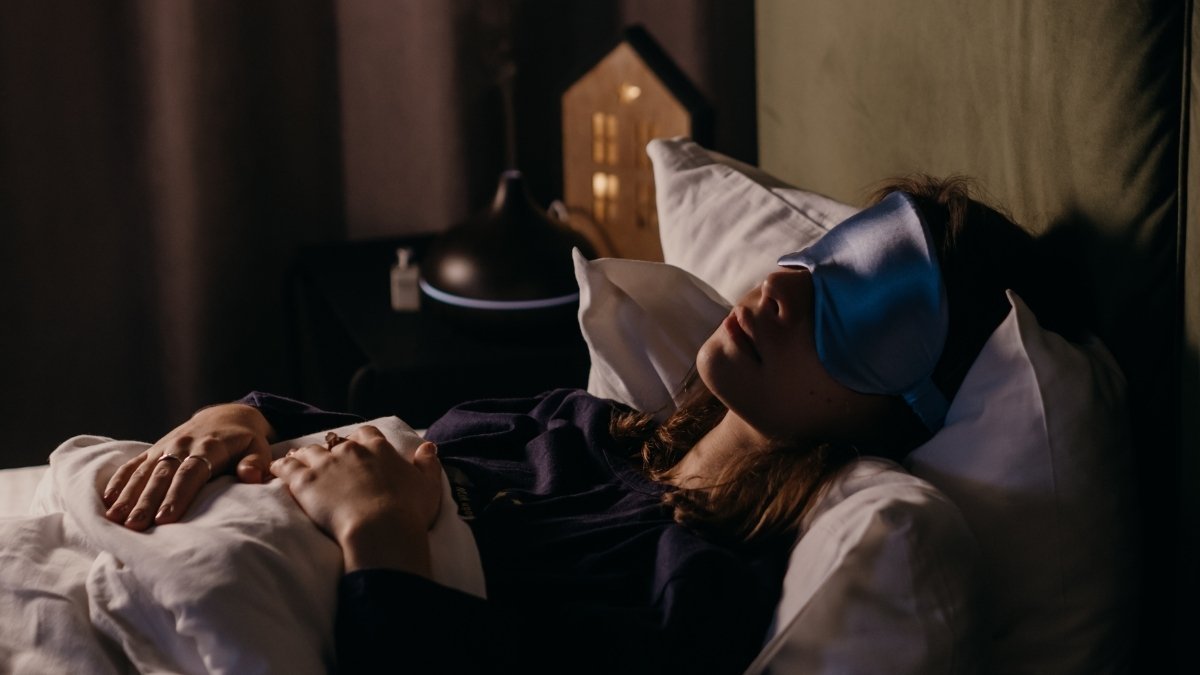
Alcohol might make you feel drowsy, but it fragments your sleep architecture and reduces time in deep sleep—exactly when your brain does its best cleaning.
Better approach: Stop drinking alcohol 3 hours before bedtime.
Mistake #4: Eating Late

Heavy meals within 3 hours of bedtime force your body to prioritize digestion over brain cleaning. You’re essentially asking your brain to multitask when it needs to focus on one job.
Better approach: Finish eating 3 hours before bed, or stick to very light snacks if needed.
What Scientists Saw When They Looked Inside Living Brains

2024 marked a historic moment: the first time scientists actually watched the brain cleaning system work in living humans.
Dr. Juan Piantino at Oregon Health & Science University used specialized brain imaging to capture something incredible—dark spaces in the brain suddenly “turning bright” as cleaning fluid flowed through them.
As Dr. Piantino explained: “Nobody has shown it before now. I was always skeptical about it myself, and there are still a lot of skeptics out there who still don’t believe it. That’s what makes this finding so remarkable.”
The images proved something crucial: human brains don’t just absorb cleaning fluid randomly. The fluid follows specific highways and pathways, just like researchers had discovered in mice.
This means everything we’ve learned about optimizing brain cleaning in animal studies directly applies to humans.
Your Tonight’s Action Plan for Better Brain Cleaning
Tonight’s Brain Cleaning Protocol
Optimal Sleep Environment Checklist
Ready to start optimizing your brain’s cleaning system? Here’s what you can do starting tonight:
The Temperature Sweet Spot
Keep your bedroom between 65-68°F. Cool temperatures promote deeper sleep and enhance cerebrospinal fluid flow.
The Screen Shutdown Protocol
Power down all devices 1-2 hours before bed. This includes your phone, TV, tablet, and computer.
Side Sleeping Setup
Use pillows to maintain a comfortable side position. Consider it an investment in long-term brain health.
The Magnesium Advantage
Take 200-400mg of magnesium glycinate before bed. This mineral enhances sleep quality and supports the neurochemical processes involved in brain cleaning.
Create Complete Darkness
Even small amounts of light can disrupt your cleaning cycle. Invest in blackout curtains or an eye mask.
The Lifestyle Boosters That Supercharge Your Brain’s Cleaning System
Lifestyle Factors That Enhance Glymphatic Function
🏃♂️ Exercise
🐟 Omega-3s
⏰ Fasting
🧘♀️ Meditation
Supplementation Protocol for Enhanced Cleaning
Beyond sleep itself, several daytime habits can enhance your brain’s nightly cleaning efficiency:
Exercise: Your Cleaning System’s Best Friend
Regular aerobic exercise increases the efficiency of those crucial water channels in your brain and improves the arterial pulsing that drives fluid circulation.
The sweet spot: 150 minutes per week of moderate exercise, but avoid intense workouts within 3 hours of bedtime.
The Omega-3 Connection
Two servings per week of fatty fish like salmon or sardines support the membrane health crucial for efficient brain cleaning.
Don’t eat fish? Consider a high-quality omega-3 supplement with both DHA and EPA.
Stress Management Is Brain Maintenance
Chronic stress elevates cortisol, which directly impairs your brain’s cleaning system.
Simple solution: Try 5-10 minutes of deep breathing before bed to shift your nervous system into cleaning mode.
Intermittent Fasting Windows
Time-restricted eating (12-16-hour fasting windows) may enhance brain cleaning by reducing metabolic load and freeing up energy for maintenance.
Easy approach: Stop eating 3 hours before bedtime and don’t eat again until morning.
The Surprising Future of Brain Cleaning Enhancement
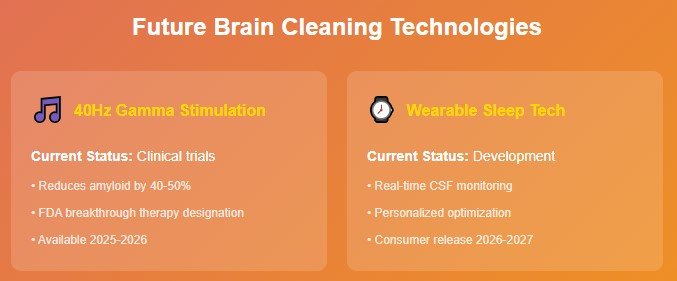
The research is moving so fast that we might soon have tools to actively boost our brain’s cleaning system.
Sound therapy: MIT researchers discovered that 40Hz sound stimulation (a specific frequency) can enhance the removal of toxic proteins from the brain. While not ready for home use yet, this could revolutionize brain health.
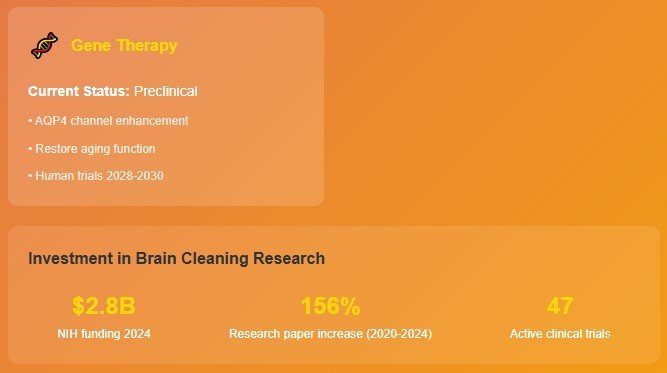
Wearable devices: Companies are developing sleep trackers that monitor cerebrospinal fluid flow in real-time and provide personalized optimization recommendations.
Targeted supplements: Researchers are identifying compounds that specifically enhance aquaporin-4 function (those crucial water channels) without disrupting natural sleep architecture.
Why This Changes Everything About How We Think About Health
This isn’t just fascinating science—it’s a fundamental shift in how we should think about daily health habits.
Sleep isn’t passive rest. It’s active brain maintenance.
Every night you prioritize quality sleep, you’re literally washing away the proteins that cause dementia. Every night you sacrifice sleep, you’re allowing toxic waste to accumulate in your brain.
The implications go beyond individual health:
- Workplace policies that prioritize adequate sleep over long hours could dramatically improve employee cognitive health
- Healthcare providers should treat sleep optimization as a first-line intervention for preventing cognitive decline
- Parents and schools need to understand that sleep isn’t optional for developing brains—it’s essential maintenance
Your Brain’s Cleaning System Needs You
Here’s the most empowering part of this entire discovery: you have significant control over how well your brain cleaning system works.
Unlike many health conditions that feel out of your control, optimizing your brain’s cleaning efficiency comes down to the choices you make every single day:
- What time do you go to bed
- Whether you use your phone before sleep
- How you manage stress
- What position do you sleep in
- Whether you exercise regularly
Every night offers a fresh opportunity to invest in your long-term cognitive health through the simple act of prioritizing quality sleep.
The Bottom Line: Your Brain’s Cleaning System Is Incredible, But It Needs Your Help
As we’ve learned more about this remarkable cleaning system, one truth has become crystal clear: the best investment you can make in your future cognitive health might be getting a great night’s sleep tonight.
Your brain has evolved an incredibly sophisticated system for maintaining itself, but it only works when you give it the right conditions.
Tonight, try this: Put your phone away an hour early, set your thermostat to 67°F, and sleep on your side. Your brain’s cleaning crew will thank you by washing away today’s cellular garbage and preparing for tomorrow’s mental challenges.
The dishwasher analogy isn’t just clever—it’s profoundly accurate. Every night, your brain becomes the most sophisticated cleaning system in the known universe.
All you have to do is let it work.
Ready to start optimizing your brain’s cleaning system tonight? Begin with just one change from this article and build from there. Your future self will thank you for taking action now.





